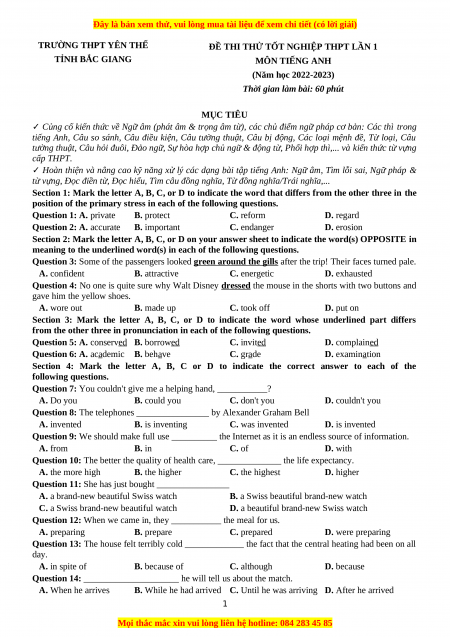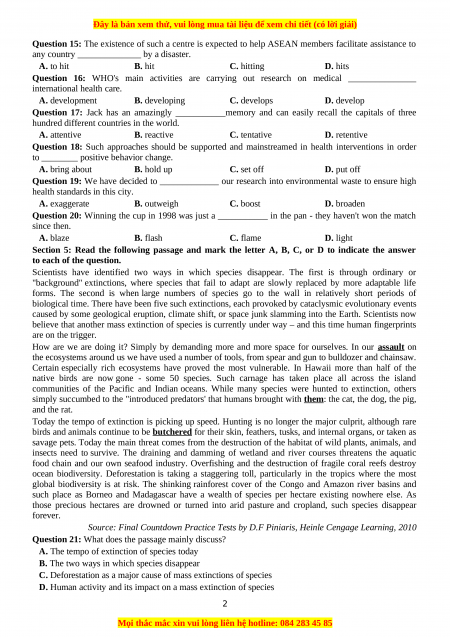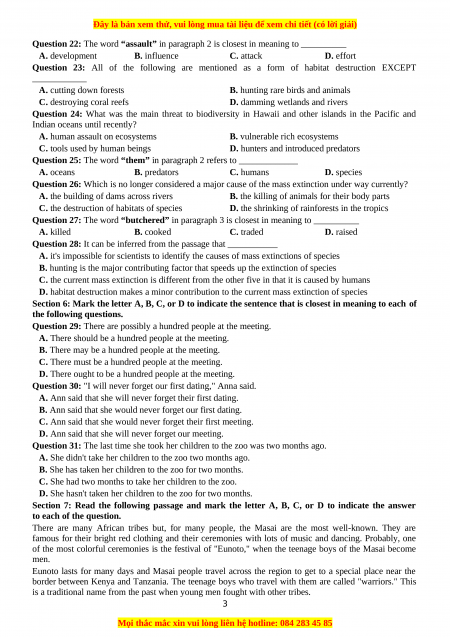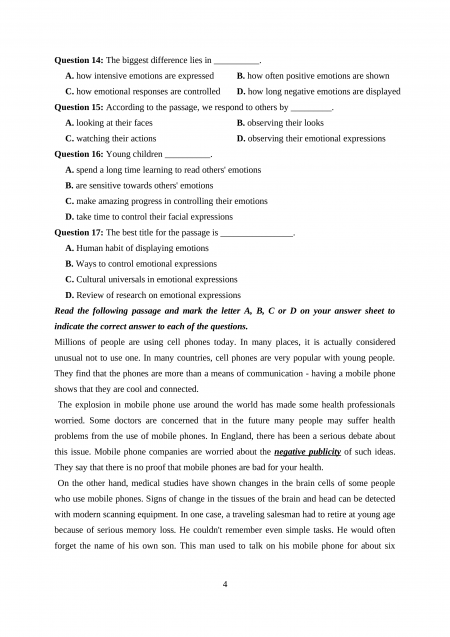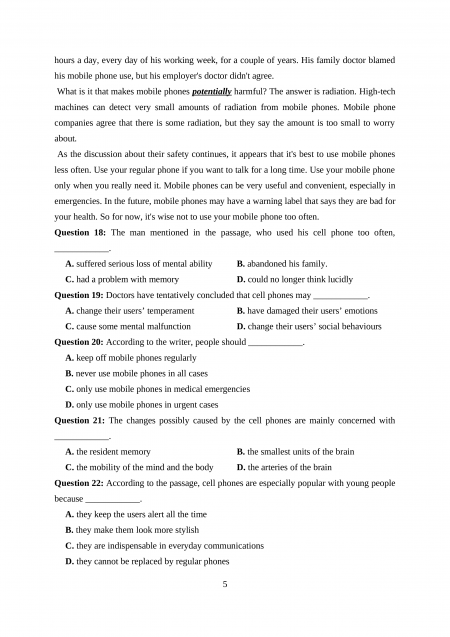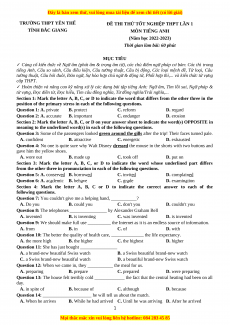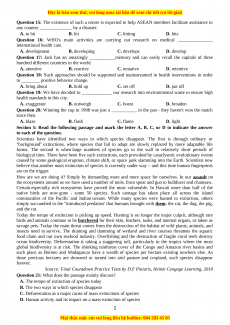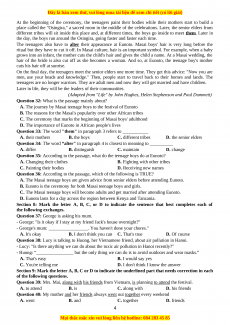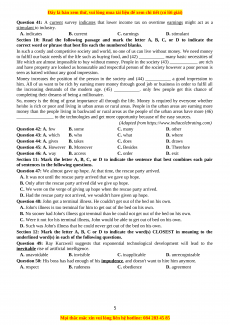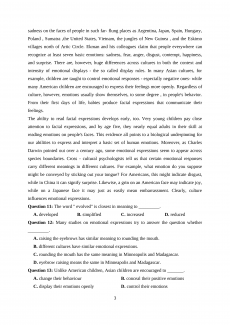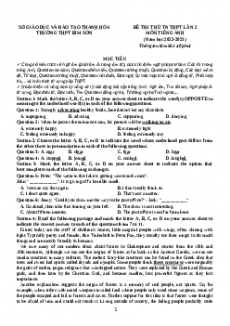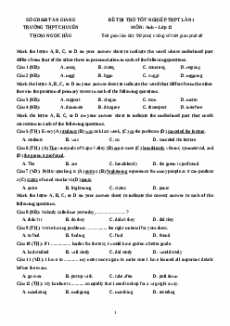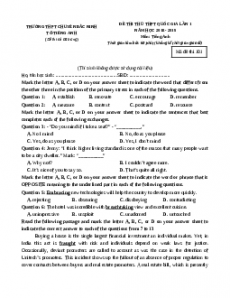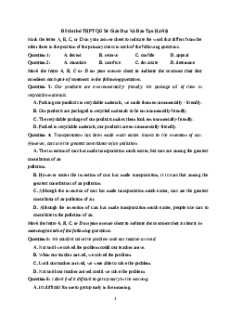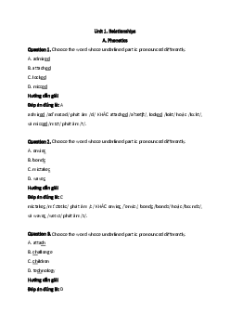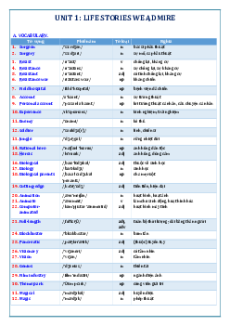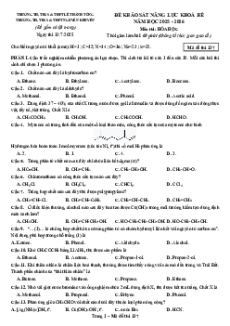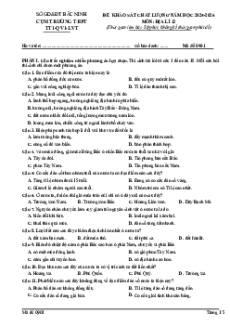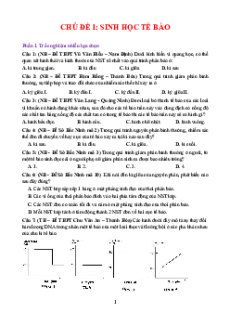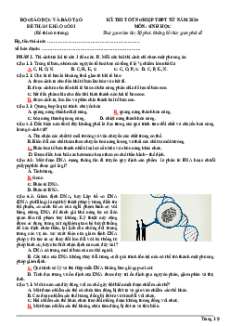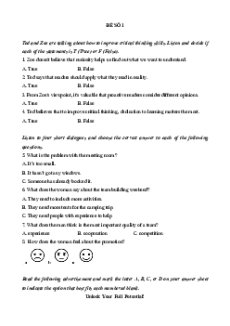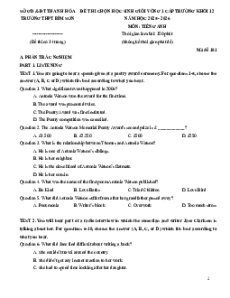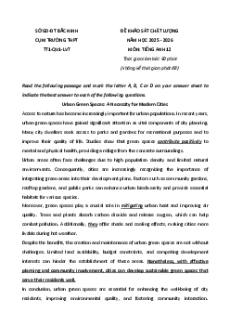TRƯỜNG THPT YÊN THẾ
ĐỀ THI THỬ TỐT NGHIỆP THPT LẦN 1 TỈNH BẮC GIANG MÔN TIẾNG ANH (Năm học 2022-2023)
Thời gian làm bài: 60 phút MỤC TIÊU
✓ Củng cố kiến thức về Ngữ âm (phát âm & trọng âm từ), các chủ điểm ngữ pháp cơ bản: Các thì trong
tiếng Anh, Câu so sánh, Câu điều kiện, Câu tường thuật, Câu bị động, Các loại mệnh đề, Từ loại, Câu
tường thuật, Câu hỏi đuôi, Đảo ngữ, Sự hòa hợp chủ ngữ & động từ, Phối hợp thì,... và kiến thức từ vựng cấp THPT.
✓ Hoàn thiện và nâng cao kỹ năng xử lý các dạng bài tập tiếng Anh: Ngữ âm, Tìm lỗi sai, Ngữ pháp &
từ vựng, Đọc điền từ, Đọc hiểu, Tìm câu đồng nghĩa, Từ đồng nghĩa/Trái nghĩa,...
Section 1: Mark the letter A, B, C, or D to indicate the word that differs from the other three in the
position of the primary stress in each of the following questions. Question 1: A. private B. protect C. reform D. regard
Question 2: A. accurate B. important C. endanger D. erosion
Section 2: Mark the letter A, B, C, or D on your answer sheet to indicate the word(s) OPPOSITE in
meaning to the underlined word(s) in each of the following questions.
Question 3: Some of the passengers looked green around the gills after the trip! Their faces turned pale. A. confident B. attractive C. energetic D. exhausted
Question 4: No one is quite sure why Walt Disney dressed the mouse in the shorts with two buttons and gave him the yellow shoes. A. wore out B. made up C. took off D. put on
Section 3: Mark the letter A, B, C, or D to indicate the word whose underlined part differs
from the other three in pronunciation in each of the following questions.
Question 5: A. conserved B. borrowed C. invited D. complained
Question 6: A. academic B. behave C. grade D. examination
Section 4: Mark the letter A, B, C or D to indicate the correct answer to each of the following questions.
Question 7: You couldn't give me a helping hand, ___________? A. Do you B. could you C. don't you D. couldn't you
Question 8: The telephones ________________ by Alexander Graham Bell A. invented B. is inventing C. was invented D. is invented
Question 9: We should make full use __________ the Internet as it is an endless source of information. A. from B. in C. of D. with
Question 10: The better the quality of health care, ______________ the life expectancy. A. the more high B. the higher C. the highest D. higher
Question 11: She has just bought ________________
A. a brand-new beautiful Swiss watch
B. a Swiss beautiful brand-new watch
C. a Swiss brand-new beautiful watch
D. a beautiful brand-new Swiss watch
Question 12: When we came in, they ___________ the meal for us. A. preparing B. prepare C. prepared D. were preparing
Question 13: The house felt terribly cold _____________ the fact that the central heating had been on all day. A. in spite of B. because of C. although D. because
Question 14: _____________________ he will tell us about the match. A. When he arrives
B. While he had arrived C. Until he was arriving D. After he arrived 1
Question 15: The existence of such a centre is expected to help ASEAN members facilitate assistance to
any country ______________ by a disaster. A. to hit B. hit C. hitting D. hits
Question 16: WHO's main activities are carrying out research on medical _______________ international health care. A. development B. developing C. develops D. develop
Question 17: Jack has an amazingly ___________memory and can easily recall the capitals of three
hundred different countries in the world. A. attentive B. reactive C. tentative D. retentive
Question 18: Such approaches should be supported and mainstreamed in health interventions in order
to ________ positive behavior change. A. bring about B. hold up C. set off D. put off
Question 19: We have decided to _____________ our research into environmental waste to ensure high
health standards in this city. A. exaggerate B. outweigh C. boost D. broaden
Question 20: Winning the cup in 1998 was just a ___________ in the pan - they haven't won the match since then. A. blaze B. flash C. flame D. light
Section 5: Read the following passage and mark the letter A, B, C, or D to indicate the answer to each of the question.
Scientists have identified two ways in which species disappear. The first is through ordinary or
"background" extinctions, where species that fail to adapt are slowly replaced by more adaptable life
forms. The second is when large numbers of species go to the wall in relatively short periods of
biological time. There have been five such extinctions, each provoked by cataclysmic evolutionary events
caused by some geological eruption, climate shift, or space junk slamming into the Earth. Scientists now
believe that another mass extinction of species is currently under way – and this time human fingerprints are on the trigger.
How are we are doing it? Simply by demanding more and more space for ourselves. In our assault on
the ecosystems around us we have used a number of tools, from spear and gun to bulldozer and chainsaw.
Certain especially rich ecosystems have proved the most vulnerable. In Hawaii more than half of the
native birds are now gone - some 50 species. Such carnage has taken place all across the island
communities of the Pacific and Indian oceans. While many species were hunted to extinction, others
simply succumbed to the "introduced predators' that humans brought with them: the cat, the dog, the pig, and the rat.
Today the tempo of extinction is picking up speed. Hunting is no longer the major culprit, although rare
birds and animals continue to be butchered for their skin, feathers, tusks, and internal organs, or taken as
savage pets. Today the main threat comes from the destruction of the habitat of wild plants, animals, and
insects need to survive. The draining and damming of wetland and river courses threatens the aquatic
food chain and our own seafood industry. Overfishing and the destruction of fragile coral reefs destroy
ocean biodiversity. Deforestation is taking a staggering toll, particularly in the tropics where the most
global biodiversity is at risk. The shinking rainforest cover of the Congo and Amazon river basins and
such place as Borneo and Madagascar have a wealth of species per hectare existing nowhere else. As
those precious hectares are drowned or turned into arid pasture and cropland, such species disappear forever.
Source: Final Countdown Practice Tests by D.F Piniaris, Heinle Cengage Learning, 2010
Question 21: What does the passage mainly discuss?
A. The tempo of extinction of species today
B. The two ways in which species disappear
C. Deforestation as a major cause of mass extinctions of species
D. Human activity and its impact on a mass extinction of species 2
Question 22: The word “assault” in paragraph 2 is closest in meaning to __________ A. development B. influence C. attack D. effort
Question 23: All of the following are mentioned as a form of habitat destruction EXCEPT ____________
A. cutting down forests
B. hunting rare birds and animals
C. destroying coral reefs
D. damming wetlands and rivers
Question 24: What was the main threat to biodiversity in Hawaii and other islands in the Pacific and Indian oceans until recently?
A. human assault on ecosystems
B. vulnerable rich ecosystems
C. tools used by human beings
D. hunters and introduced predators
Question 25: The word “them” in paragraph 2 refers to _____________ A. oceans B. predators C. humans D. species
Question 26: Which is no longer considered a major cause of the mass extinction under way currently?
A. the building of dams across rivers
B. the killing of animals for their body parts
C. the destruction of habitats of species
D. the shrinking of rainforests in the tropics
Question 27: The word “butchered” in paragraph 3 is closest in meaning to __________ A. killed B. cooked C. traded D. raised
Question 28: It can be inferred from the passage that ___________
A. it's impossible for scientists to identify the causes of mass extinctions of species
B. hunting is the major contributing factor that speeds up the extinction of species
C. the current mass extinction is different from the other five in that it is caused by humans
D. habitat destruction makes a minor contribution to the current mass extinction of species
Section 6: Mark the letter A, B, C, or D to indicate the sentence that is closest in meaning to each of the following questions.
Question 29: There are possibly a hundred people at the meeting.
A. There should be a hundred people at the meeting.
B. There may be a hundred people at the meeting.
C. There must be a hundred people at the meeting.
D. There ought to be a hundred people at the meeting.
Question 30: "I will never forget our first dating," Anna said.
A. Ann said that she will never forget their first dating.
B. Ann said that she would never forget our first dating.
C. Ann said that she would never forget their first meeting.
D. Ann said that she will never forget our meeting.
Question 31: The last time she took her children to the zoo was two months ago.
A. She didn't take her children to the zoo two months ago.
B. She has taken her children to the zoo for two months.
C. She had two months to take her children to the zoo.
D. She hasn't taken her children to the zoo for two months.
Section 7: Read the following passage and mark the letter A, B, C, or D to indicate the answer to each of the question.
There are many African tribes but, for many people, the Masai are the most well-known. They are
famous for their bright red clothing and their ceremonies with lots of music and dancing. Probably, one
of the most colorful ceremonies is the festival of "Eunoto," when the teenage boys of the Masai become men.
Eunoto lasts for many days and Masai people travel across the region to get to a special place near the
border between Kenya and Tanzania. The teenage boys who travel with them are called "warriors." This
is a traditional name from the past when young men fought with other tribes. 3
At the beginning of the ceremony, the teenagers paint their bodies while their mothers start to build a
place called the "Osingira," a sacred room in the middle of the celebrations. Later, the senior elders from
different tribes will sit inside this place and, at different times, the boys go inside to meet them. Later in
the day, the boys run around the Osingira, going faster and faster each time.
The teenagers also have to alter their appearance at Eunoto. Masai boys' hair is very long before the
ritual but they have to cut it off. In Masai culture, hair is an important symbol. For example, when a baby
grows into an infant, the mother cuts the child's hair and gives the child a name. At a Masai wedding, the
hair of the bride is also cut off as she becomes a woman. And so, at Eunoto, the teenage boy's mother cuts his hair off at sunrise.
On the final day, the teenagers meet the senior elders one more time. They get this advice: "Now you are
men, use your heads and knowledge." Then, people start to travel back to their homes and lands. The
teenagers are no longer warriors. They are adult men and now they will get married and have children.
Later in life, they will be the leaders of their communities.
(Adapted from "Life" by John Hughes, Helen Stephenson and Paul Dummett)
Question 32: What is the passage mainly about?
A. The journey by Masai teenage boys to the festival of Eunoto
B. The reasons for the Masai's popularity over other African tribes
C. The ceremony that marks the beginning of Masai boys' adulthood
D. The importance of Eunoto in African people's lives
Question 33: The word "them" in paragraph 3 refers to ___________ A. their mothers B. the boys C. different tribes D. the senior elders
Question 34: The word “alter" in paragraph 4 is closest in meaning to __________ A. differ B. distinguish C. maintain D. change
Question 35: According to the passage, what do the teenage boys do at Eunoto?
A. Changing their clothes
B. Fighting with other tribes
C. Painting their bodies D. Receiving new names
Question 36: According to the passage, which of the following is TRUE?
A. The Masai teenage boys are given advice from senior elders before attending Eunoto.
B. Eunoto is the ceremony for both Masai teenage boys and girls.
C. The Masai teenage boys will become adults and get married after attending Eunoto.
D. Eunoto lasts for a day across the region between Kenya and Tanzania.
Section 8: Mark the letter A, B, C, or D to indicate the sentence that best completes each of the following exchanges.
Question 37: George is asking his mum.
- George: "Is it okay if I stay at my friend Jack's house overnight?"
- George's mum: _________________. You haven't done your chores." A. It's okay
B. I don't think you can C. That's true D. Of course
Question 38: Lucy is talking to Huong, her Vietnamese friend, about air pollution in Hanoi.
- Lucy: "Is there anything we can do about the toxic air pollution in Hanoi recently?"
- Huong: “________________ but the only thing we can do is to avoid outdoors and wear masks.” A. That's easy B. I would say yes C. You're telling me
D. I don't think I know the answer
Section 9: Mark the letter A, B, C or D to indicate the underlined part that needs correction in each of the following questions.
Question 39: Mrs. Mai, along with his friends from Vietnam, is planning to attend the festival. A. to attend B. is C. along with D. his friends
Question 40: My mother and her friends always went out together every weekend A. went B. and C. together D. friends 4
Đề thi thử THPTQG Sở Giáo Dục Và Đào Tạo Hà Nội
Mark the letter A, B, C, or D on your answer sheet to indicate the word that differs from the
other three in the position of the primary stress in each of the following questions. Question 1: A. decent B. reserve C. confide D. appeal Question 2: A. stimulate B. sacrifice C. devastate D. determine
Mark the letter A, B, C or D on your answer sheet to indicate the sentence that best
combines each pair of sentences in the following questions.
Question 3: Our products are environmentally- friendly. We package all of them in recyclable materials.
A. Packing our products in recyclable materials, we made them environmentally - friendly.
B. Our products are packaged in recycled materials to be environmentally-friendly.
C. The recyclable package of our products makes them look environmentally-friendly.
D. Packed in recyclable materials, our products are environmentally-friendly.
Question 4: Transportation has been made much easier thanks to the invention of car.
However, cars are the greatest contributor of air pollution.
A. The invention of cars has made transportation much easier, but cars are among the greatest contributors of air pollution.
B. However easier the invention of cars has made transportation, it is cars that among the
greatest contributors of air pollution.
C. Although the invention of cars has made transportation much easier, cars are the greatest
contributor of air pollution of air.
D. Although the invention of cars has made transportation much easier, people use cars to
contribute to the pollution of air.
Mark the letter A, B, C, or D on your answer sheet to indicate the sentence that is closest in
meaning to each of the following questions.
Question 5: We couldn't solve the problem until our teacher arrived.
A. Not until we solved the problem could our teacher arrive.
B. When our teacher arrived, we solved the problem.
C. Until our teacher arrived, we were able to solve the problem.
D. Not until our teacher arrived could we solve the problem.
Question 6: I don't find it difficult to get up early in the morning.
A. It's difficult for me to get up early in the morning. 1
B. I'm used to getting up early in the morning.
C. I hate getting up early in the morning.
D. I used to get up early in the morning.
Question 7: I thought she was the right person for the position, yet it turned put that she was quite useless.
A. Because I was expecting her to be competent, I was shocked to see her perform rather badly.
B. I was mistaken about her suitability for the position since she proved rather incompetent.
C. Contrary to my initial impression, she was not totally unsuitable for the position.
D. I was right in thinking that she was totally useless for the job.
Mark the letter A, B, C, or D on your answer sheet to indicate the underlined part that
needs correction in each of the following questions.
Question 8: Fifty minutes are the maximum length of time allotted for the exam. A. are B. length C. maximum D. allotted
Question 9: For its establishment, ASEAN Tourism Association has played an important role
in promoting and developing ASEAN Tourism services. A. Tourism Association B. played
C. in promoting and developing D. For its
Question 10: The occean probably distinguishes the earth from other planets of the solar
system, for scientists believe that large bodies of water are not existing on the other planets. A. probably B. for C. are not existing D. from
Read the following passage and mark the letter A, B, C or D on your answer sheet to
indicate the correct answer to each of the questions.
You can usually tell when your friends are happy or angry by the looks on their faces or by
their actions. This is useful because reading their emotional expressions helps you to know
how to respond to them. Emotions have evolved to help us respond to important situations
and to convey our intentions to others. But does raising the eyebrows and rounding the mouth
say the same thing in Minneapolis as it does in Madagascar? Much research on emotional
expressions has centered on such questions.
According to Paul Ekman, the leading researcher in this area, people speak and understand
substantially the same "facial language". Studies by Ekman's group have demonstrated that
humans share a set of universal emotional expressions that testify to the common biological
heritage of the human species. Smiles, for example, signal happiness and frowns indicate 2
sadness on the faces of people in such far- flung places as Argentina, Japan, Spain, Hungary,
Poland , Sumatra ,the United States, Vietnam, the jungles of New Guinea , and the Eskimo
villages north of Artic Circle. Ekman and his colleagues claim that people everywhere can
recognize at least seven basic emotions: sadness, fear, anger, disgust, contempt, happiness,
and surprise. There are, however, huge differences across cultures in both the context and
intensity of emotional displays - the so called display rules. In many Asian cultures, for
example, children are taught to control emotional responses - especially negative ones- while
many American children are encouraged to express their feelings more openly. Regardless of
culture, however, emotions usually show themselves, to some degree , in people's behavior.
From their first days of life, babies produce facial expressions that communicate their feelings.
The ability to read facial expressions develops early, too. Very young children pay close
attention to facial expressions, and by age five, they nearly equal adults in their skill at
reading emotions on people's faces. This evidence all points to a biological underpinning for
our abilities to express and interpret a basic set of human emotions. Moreover, as Charles
Darwin pointed out over a century ago, some emotional expressions seem to appear across
species boundaries. Cross - cultural psychologists tell us that certain emotional responses
carry different meanings in different cultures. For example, what emotion do you suppose
might be conveyed by sticking out your tongue? For Americans, this might indicate disgust,
while in China it can signify surprise. Likewise, a grin on an American face may indicate joy,
while on a Japanese face it may just as easily mean embarrassment. Clearly, culture
influences emotional expressions.
Question 11: The word " evolved" is closest in meaning to _________. A. developed B. simplified C. increased D. reduced
Question 12: Many studies on emotional expressions try to answer the question whether _________.
A. raising the eyebrows has similar meaning to rounding the mouth.
B. different cultures have similar emotional expressions.
C. rounding the mouth has the same meaning in Minneapolis and Madagascar.
D. eyebrow raising means the same in Minneapolis and Madagascar.
Question 13: Unlike American children, Asian children are encouraged to _______.
A. change their behaviour
B. conceal their positive emotions
C. display their emotions openly
D. control their emotions 3
Question 14: The biggest difference lies in __________.
A. how intensive emotions are expressed
B. how often positive emotions are shown
C. how emotional responses are controlled
D. how long negative emotions are displayed
Question 15: According to the passage, we respond to others by _________.
A. looking at their faces
B. observing their looks
C. watching their actions
D. observing their emotional expressions
Question 16: Young children __________.
A. spend a long time learning to read others' emotions
B. are sensitive towards others' emotions
C. make amazing progress in controlling their emotions
D. take time to control their facial expressions
Question 17: The best title for the passage is ________________.
A. Human habit of displaying emotions
B. Ways to control emotional expressions
C. Cultural universals in emotional expressions
D. Review of research on emotional expressions
Read the following passage and mark the letter A, B, C or D on your answer sheet to
indicate the correct answer to each of the questions.
Millions of people are using cell phones today. In many places, it is actually considered
unusual not to use one. In many countries, cell phones are very popular with young people.
They find that the phones are more than a means of communication - having a mobile phone
shows that they are cool and connected.
The explosion in mobile phone use around the world has made some health professionals
worried. Some doctors are concerned that in the future many people may suffer health
problems from the use of mobile phones. In England, there has been a serious debate about
this issue. Mobile phone companies are worried about the negative publicity of such ideas.
They say that there is no proof that mobile phones are bad for your health.
On the other hand, medical studies have shown changes in the brain cells of some people
who use mobile phones. Signs of change in the tissues of the brain and head can be detected
with modern scanning equipment. In one case, a traveling salesman had to retire at young age
because of serious memory loss. He couldn't remember even simple tasks. He would often
forget the name of his own son. This man used to talk on his mobile phone for about six 4
ĐỀ THI THỬ THPT QUỐC GIA LẦN 1
TRƯỜNG THPT CHUYÊN BẮC NINH NĂM HỌC 2018 - 2019 TỔ TIẾNG ANH Môn: Tiếng Anh
(Đề thi có 08 trang)
Thời gian làm bài: 60 phút (không kể thời gian giao đề) Mã đề thi 101
(Thí sinh không được sử dụng tài liệu)
Họ, tên học sinh: .................................................SBD: ................................
Mark the letter A, B, C, or D on your answer sheet to indicate the word that differs from
the other three in the position of the primary stress in each of the following questions. Question 1: A. establish B. renovate C. encourage D. remember Question 2: A. measure B. context C. postcard D. resource
Mark the letter A, B, C, or D on your answer sheet to indicate the sentences that best
completes each of the following exchanges.
Question 3: - “Do you mind if I take a seat?” - “__________.” A. No I mind B. No, do as you please
C. Yes, do as you please D. Yes, I don’t mind
Question 4: Jenny: “I think higher living standard is one of the reason that many people want
to be a city dweller.” Mark: “__________” A. Why not?
B. I couldn’t agree more.
C. It’s nice of you to say so.
D. That’s quite all right.
Mark the letter A, B, C, or D on your answer sheet to indicate the word or phrase that is
OPPOSITE meaning to the underlined part in each of the following questions.
Question 5: Embracing new technologies will help the country to develop more quickly. A. rejecting B. obscuring C. disobeying D. contradicting
Question 6: The hotel was incredible with breathtaking view and excellent cuisine. A. unimpressive B. unsploit C. unadorned D. untouched
Read the following passage and mark the letter A, B, C, or D on your answer sheet to
indicate the correct answer to each of the questions from 7 to 13
Buying a house is the single largest financial investment an individual makes. Yet, in
India this act is fraught with risk and individuals depend on weak laws for justice.
Occasionally, deviant promoters are called to account as was the case in the detention of
Unitech’s promoters. This incident shows up the fallout of an absence of proper regulation to
cover contracts between buyers and real estate promoters. A real estate bill, which is presently
pending in Rajya Sabha, seeks to fill this gap. It has been debated for over two years and
should be passed by Parliament in the budget session.
India is in the midst of rapid urbanization and urban population is expected to more than
double to about 900 million over the next three decades. Unfortunately, even the current
population does not have adequate housing. A government estimate in 2012 put the shortage at
nearly 19 million units. If this shortage is to be alleviated quickly, India’s messy real estate sector needs reforms.
The real estate bill seeks to set standards for contracts between buyers and sellers.
Transparency, a rare commodity in real estate, is enforced as promoters have to upload project
details on the regulators’ website. Importantly, standard definitions of terms mean that buyers
will not feel cheated after taking possession of a house. In order to protect buyers who pay
upfront, a part of the money collected for a real estate project is ring-fenced in a separate bank
account. Also, given the uncertainty which exists in India on land titles, the real estate bill
provides title insurance. This bill has been scrutinized by two parliamentary committees and its passage now brooks no delay.
This bill is an important step in cleaning up the real estate market, but the journey
should not end with it. State governments play a significant role in real estate and they are
often the source of problems. Some estimates suggest that real estate developers have to seek
approvals of as many as 40 central and state departments, which lead to delays and an
escalation in the cost of houses. Sensibly, NDA government’s project to provide universal
urban housing forces states to institute reforms to access central funding. Without real estate
reforms at the level of states, it will not be possible to meet the ambition of making housing
accessible for all urban dwellers.
Question 7: What is the passage mainly about?
A. The obstacles and resolutions to India’s real estate market
B. The urban dwellers’ inaccessibility to housing
C. The need for urgent reform in housing distribution
D. The lack of housing in India
Question 8: According to the passage, which of the following is the pending in Raiya Sabha? A. Real estate bill
B. Universal rural housing programme
C. Universal urban housing programme
D. NDA government’s new scheme
Question 9: Which of the following is NOT TRUE according to the passage?
A. India’s real estate sector needs
B. Real state bill has been scrutinized by two parliamentary
C. Current population does not have adequate housing in
D. Urban population is expected to more than double to about 850 million over the next three
Question 10: The word “fraught” in paragraph 1 is closest in meaning to __________. A. coping B. contentious C. overflowing D. tolerable
Question 11: According to the passage, state governments __________.
A. encourage the real estate market
B. obstruct reforms to access universal urban housing
C. hinder the housing purchase process
D. reject to mount the housing fee
Question 12: The word “they” in the last paragraph refers to __________. A. developers B. governments C. estimates D. problems
Question 13: The word “escalation” in the last paragraph is closest in meaning to . A. growth B. degradation C. revolution D. decrease
Mark the letter A, B, C, or D on your answer sheet to indicate the sentence that best
combines each pair of sentences of the following questions.
Question 14: His academic record at high school was poor. He failed to apply to that prestigious university.
A. His academic record at high school was poor as a result of his failure to apply to that prestigious university.
B. Failing to apply to that prestigious university, his academic record at high school was poor.
C. His academic record at high school was poor; as a result, he failed to apply to that prestigious university.
D. His academic record at high school was poor because he didn’t apply to that prestigious university.
Question 15: My new neighbour is a famous author. My new neighbour is also an influential political commentator.
A. My new neighbour is a famous author, and she is an influential political commentator.
B. My new neighbour likes writing famous books and commenting on politics.
C. My new neighbour is not only a famous author but also an influential political commentator.
D. My new neighbour writes famous books, but she does not know much about politics.
Read the following passage and mark the letter A, B, C, or D on your answer sheet to
indicate the correct answer to each of the questions from 16 to 23
Let children learn to judge their own work. A child learning to talk does not learn by
being corrected all the time. If corrected too much, he will stop talking. He notices a thousand
times a day the difference between the language he uses and the language those around him
use. Bit by bit, he makes the necessary changes to make his language like other people’s. In the
same way, children learn all the other things they learn to do without being taught – to talk,
run, climb, whistle, ride a bicycle – compare their own performances with those of more
skilled people, and slowly make the needed changes. But in school we never give a child a
chance to find out his mistakes for himself, let alone correct them. We do it all for him. We act
as if we thought that he would never notice a mistake unless it was pointed out to him, or
correct it unless he was made to. Soon he becomes dependent on the teacher. Let him do it
himself. Let him work out, with the help of other children if he wants it, what this word says,
what the answer is to that problem, whether this is a good way of saying or doing this or not.
If it is a matter of right answers, as it may be in mathematics or science, give him the
answer book. Let him correct his own papers. Why should we, teachers, waste time on such
routine work? Our job should be to help the child when he tells us that he can’t find the way to
get the right answer. Let’s end all this nonsense of grades, exams, and marks. Let us throw
them all out, and let the children learn what all educated persons must someday learn, how to
measure their own understanding, how to know what they know or do not know.
Let them get on with this job in the way that seems most sensible to them, with our help
as school teachers if they ask for it. The idea that there is a body of knowledge to be learnt at
school and used for the rest of one’s life is nonsense in a world as complicated and rapidly
changing as ours. Anxious parents and teachers say, “But suppose they fail to learn something
essential, something they will need to get on in the world?” Don’t worry! If it is essential, they
will go out into the world and learn it.
Question 16: What does the author think is the best way for children to learn things?
A. By listening to explanations from skilled people
B. By copying what other people do
C. By asking a great many questions
D. By making mistakes and having them corrected
Question 17: The passage suggests that learning to speak and learning to ride a bicycle are __________.
A. basically the same as learning other skills
B. basically different from learning adult skill
C. not really important skills
D. more important than other skills
Document Outline
- Mark the letter A, B, C, or D on your answer sheet to indicate the word that differs from the other three in the position of the primary stress in each of the following questions.
- Mark the letter A, B, C, or D on your answer sheet to indicate the sentences that best completes each of the following exchanges.
- Mark the letter A, B, C, or D on your answer sheet to indicate the word or phrase that is OPPOSITE meaning to the underlined part in each of the following questions.
- Read the following passage and mark the letter A, B, C, or D on your answer sheet to indicate the correct answer to each of the questions from 7 to 13
- Mark the letter A, B, C, or D on your answer sheet to indicate the sentence that best combines each pair of sentences of the following questions.
- Read the following passage and mark the letter A, B, C, or D on your answer sheet to indicate the correct answer to each of the questions from 16 to 23
- Mark the letter A, B, C, or D on your answer sheet to indicate the word whose underlined part differs from the other three in pronunciation in each of the following questions.
- Mark the letter A, B, C or D on your answer sheet to indicate the correct answer to each of the following questions.
- Mark the letter A, B, C, or D to indicate the word or phrase that is CLOSEST in meaning to the underlined part in each of the following questions.
- Mark the letter A, B, C or D on your answer sheet to indicate the underlined part that needs correction in each of the following questions.
- Read the following passage and mark the letter A, B, C, or D on your answer sheet to indicate the word(s) that best fits each of the numbered blanks from 43 to 47
- Mark the letter A, B, C, or D on your answer sheet to indicate the sentence that is closest in meaning to each of the following questions.
Đề 1 - THPT Chuyên Thái Bình (Lần 1)
ĐỀ THI PHÂN BAN LẦN 1 NĂM HỌC 2020-2021
MÔN: TIẾNG ANH LỚP 12
Thời gian làm bài: 60 phút
Read the following passage and mark the letter A, B, C or D on your answer sheet to indicate the
correct answer to each of the following questions.
Books which give instructions on how to do things are very popular in the United States today.
Thousands of these How-to books are useful. In fact, there are about four thousand books with titles
that begin with the words “How to”. One book may tell you how to earn more money. Another may tell
you how to save or spend it and another may explain how to give your money away.
Many How-to books give advice on careers. They tell you how to choose a career and how to succeed
in it. If you fail, however, you can buy the book “How to Turn Failure into Success”. If you would like
to become very rich, you can buy the book “How to Make a Millionaire”. If you never make any
money at all, you may need a book called “How to Live on Nothing”.
One of the most popular types of books is one that helps you with personal problems. If you want to
have a better love of life, you can read “How to Succeed in Love every Minute of Your Life”. If you
are tired of books on happiness, you may prefer books which give step-by-step instructions on how to redecorate or enlarge a house.
Why have How-to books become so popular? Probably because life has become so complex. Today
people have far more free time to use, more choices to make, and more problems to solve. How-to
books help people deal with modern life.
Question 1: What is the passage mainly about?
A. How to succeed in love every minute of your life.
B. How to turn failure into success.
C. How to make a millionaire. D. How-to books.
Question 2: The word “it” in paragraph 2 refers to ______. A. advice B. instruction C. how-to books D. career
Question 3: Which of the following is NOT the type of books giving information on careers?
A. “How to Succeed in Love every Minute of Your Life”
B. “How to Live on Nothing”
C. “How to Make a Millionaire”
D. “How to Turn Failure into Success”
Question 4: The word “step-by-step” in paragraph 3 is closest in meaning to ______. A. little by little B. gradually C. slower and slower D. A and B
Question 5: It can be inferred from the passage that ______.
A. Today people are more bored with the modern life.
B. Modern life is more difficult to deal with.
C. Today people have fewer choices to make.
D. Today people are more interested in modern life.
Mark the letter A, B, C or D to indicate the word whose underlined part differs from the other three
in pronunciation in each of the following questions.
Question 6: A. bushes B. wishes C. researches D. headaches Question 7: A. bachelor B. chapter C. chemistry D. teacher
Mark the letter A, B, C, or D to indicate the word that differs from the other three in the position of
primary stress in each of the following questions.
Question 8: A. decorate B. disabled C. privacy D. integrate Question 9: A. magpie B. engaged C. import D. fortune
Read the following passage and mark the letter A, B, C or D on your answer sheet to indicate the
correct answer to each of the following questions.
Most desert animals will drink water if confronted with it, but many of them never have any
opportunity. All living things must have water, or they will expire. The herbivores find it in desert
plants. The carnivores slake their thirst with the flesh and blood of living prey. One of the most
remarkable adjustments, however, has been made by the tiny kangaroo rat, who not only lives without
drinking but subsists on a diet of dry seeds containing about 5% free water. Like other animals, he has
the ability to manufacture water in his body by a metabolic conversion of carbohydrates. But he is
notable for the parsimony with which he conserves his small supply by every possible means,
expending only minuscule amounts in his excreta and through evaporation from his respiratory tract.
Investigation into how the kangaroo rat can live without drinking water has involved various
experiments with these small animals. Could kangaroo rats somehow store water in their bodies and
slowly utilize these resources in the long periods when no free water is available from dew or rain? The
simplest way to settle this question was to determine the total water content in the animals to see if it
decreases as they are kept for long periods on a dry diet. If they slowly use up their water, the body
should become increasingly dehydrated, and if they begin with a store of water, this should be evident
from an initial high water content. Results of such experiments with kangaroo rats on dry diets for more
than 7 weeks showed that the rats maintained their body content during the long period of water
deprivation. When the kangaroo rats were given free access to water, they did not drink water. They
did nibble on small pieces of watermelon, but this did not change appreciably the water intent in their
bodies, which remained at 66.3% to 67.2% during this period.
This is very close to the water content of dry-fed animals (66.5%), and the availability of free water,
therefore, did not lead to any “storage” that could be meaningful as a water reserve. This makes it
reasonable to conclude that physiological storage of water is not a factor in the kangaroo rat’s ability to live on dry food.
Question 10: What is the topic of this passage? A. Kangaroo rats B. Water in the desert C. Desert life
D. Physiological experiments
Question 11: The word “expire” in line 2 is closest in meaning to ______. A. become ill B. die C. shrink D. dehydrate
Question 12: Which of the following is NOT a source of water for the desert animals? A. Desert plans
B. Metabolic conversion of carbohydrates in the body
C. The blood of other animals D. Streams
Question 13: The author states that the kangaroo rat is known for all of the following EXCEPT ______.
A. the economy with which it uses available water
B. living without drinking water
C. breathing slowly and infrequently
D. manufacturing water internally
Question 14: The word “parsimony” in line 6 is closest in meaning to ______. A. intelligence B. desire C. frugality D. skill
Question 15: It is implied by the author that desert animals can exist with little or no water because of ______.
A. less need for water than other animals
B. many opportunities for them to find water
C. their ability to eat plants
D. their ability to adjust to the desert environment
Question 16: According to the passage, the results of the experiments with kangaroo rats showed that ______.
A. kangaroo rats store water for use during dry periods
B. kangaroo rats took advantage of free access to water
C. there was no significant change in body weight due to lack of water or accessibility to water
D. a dry diet seems detrimental to the kangaroo rat’s health
Mark the letter A, B, C or D to indicate the word(s) OPPOSITE in meaning to the underlined
word(s) in each of the following questions.
Question 17: In Thailand, it’s against the law to litter on the pavement. If you are caught, you can be fined up to 2000 Baht. A. evil B. illegal C. immoral D. legal
Question 18: Her physical condition was not an impediment to her career as a singer. She has won a lot of prizes. A. advantage B. obstacle C. barrier D. disadvantage
Mark the letter A, B, C or D on your answer sheet to indicate the correct answer to each of the following questions.
Question 19: Don’t ______ in my presentation with your comments like that. It is so annoying and rude. A. take B. chip C. interrupt D. cut
Question 20: Applications ______ in after 30 April will not be considered. A. sent B. send C. that is sent D. which sent
Question 21: I didn’t ______ to see my aunt when I was in Paris. A. take B. make C. get D. meet
Question 22: If you had taken my advice, you ______ in such difficulties now. A. won’t be B. hadn’t been C. wouldn’t be D. wouldn’t have been
Question 23: This room is smoky. I wish you ______ smoking. A. would stop B. have stopped C. stop D. stopping
Question 24: David is a rich man because he ______ a lot of money last year. A. went through B. checked in C. fell behind D. came into
Question 25: Action movies may have a negative ______ on children. A. opinion B. influence C. dependence D. decision
Question 26: I’m not used ______ as early as this. A. get up B. getting up C. to get up D. to getting up
Question 27: Winning the cup in 1998 was just a ______ in the pan – they haven’t won the match since then. A. blaze B. flame C. light D. flash
Question 28: He took one of ______ books at ______ random. A. / B. the/ C. / the D. / a
Question 29: Nobody likes him because he is ______. A. displease B. pleasure C. pleasant D. unpleasant
Question 30: He went to work early this morning ______ he had to translate an urgent letter into English for his boss. A. although B. because C. in spite of D. because of
Question 31: ______ as the representative at the conference, she felt extremely proud of herself. A. On choosing B. Having been chosen C. Be chosen D. Having chosen
Question 32: Nobody called the phone, ______? A. did it B. didn’t he C. did they D. didn’t they
Question 33: He plagued me ______ stupid questions all through lunch. A. for B. at C. with D. on
Mark the letter A, B, C or D to indicate the word(s) CLOSEST in meaning to the underlined word(s)
in each of the following questions.
Question 34: I can’t spend a lot of time talking about your problem. I have other fish to fry. A. to take the rest B. to cook the food C. to meet the friends
D. some important things to do
Question 35: The aircraft carrier is indispensable in naval operations against sea or shore based enemies. A. unique B. novel C. vital D. exotic
Mark the letter A, B, C or D on your answer sheet to indicate the sentence that is closest in meaning
to each of the following questions
Question 36: People believed that Jane failed the test because of her laziness.
A. It is believed that Jane failed the test because of her laziness.
B. Jane was believed to fail the test on account of her laziness.
C. Jane is believed to fail the test owing to her laziness.
D. It was believed that Jane had failed the test due to laziness.
Question 37: He broke up with her but now he thinks that was a mistake.
A. He feels a pity that he had broken up with her.
B. He wishes not to have broken her up.
C. He regrets having broken up with her.
D. He was mistaken with breaking up with her.
Question 38: “My father doesn’t work in the factory any more” Bella told us.
A. Bella said that her father no longer worked in the factory.
SỞ GIÁO DỤC VÀ ĐÀO TẠO THANH HÓA
ĐỀ THI THỬ TN THPT LẦN 2
TRƯỜNG THPT BỈM SƠN MÔN TIẾNG ANH (Năm học 2022-2023)
Thời gian làm bài: 40 phút MỤC TIÊU
✓ Củng cố kiến thức về Ngữ âm (phát âm & trọng âm từ), các chủ điểm ngữ pháp cơ bản: Các thì trong
tiếng Anh, Question so sánh, Question điều kiện, Question tường thuật, Question bị động, Các loại mệnh
đề, Từ loại, Question tường thuật, Question hỏi đuôi, Đảo ngữ, Sự hòa hợp chủ ngữ & động từ, Phối hợp
thì,... và kiến thức từ vựng cấp THPT.
✓ Hoàn thiện và nâng cao kỹ năng xử lý các dạng bài tập tiếng Anh: Ngữ âm, Tìm lỗi sai, Ngữ pháp &
từ vựng, Đọc điền từ, Đọc hiểu, Tìm Question đồng nghĩa, Từ đồng nghĩa/Trái nghĩa,...
Section 1: Mark the letter A, B, C, or D on your answer sheet to indicate the word(s) OPPOSITE in
meaning to the underlined word(s) in each of the following questions.
Question 1: Strongly advocating healthy foods, Jane doesn't eat any chocolate. A. impugning B. advising C. supporting D. denying
Question 2: When he passes the entrance exam, his parents will be walking on air. A. extremely happy B. extremely light
C. feeling extremely unhappy
D. feeling extremely airy
Section 2: Choose the letter A, B, C, or D to indicate the word whose underlined part differs from
the other three in pronunciation in each of the following questions. Question 3: A. near B. clear C. fear D. bear Question 4: A. stopped B. joined C. cooked D. laughed
Section 3: Mark the letter A, B, C, or D on your answer sheet to indicate the option that
best completes each of the following exchanges.
Question 5: Peter: "The water in this lake is getting worse and worse".
John:" ____________". It is giving off a horrible smell.
A. You can say that again.
B. I don't really think so.
C. I don't quite agree.
D. That's not a matter.
Question 6: Jenny: "Could you show me the way to the post office?’ - Jack: "___________"
A. Go ahead, then take first turning on your left.
B. The show is not interesting.
C. About fifteen minutes.
D. The post office is not far from here.
Section 4: Read the following passage and mark the letter A, B, C, or D on your answer sheet to
indicate the correct answer to each of the questions from 7 to 11.
Fairies today are the stuff of children's stories, little magical people with wings, often shining with
light. Typically pretty and female, like Tinkerbell in Peter Pan, they usually use their magic to do small
things and are mostly friendly to humans.
We owe many of our modern ideas about fairies to Shakespeare and stories from the 18th and
19th centuries. Although we can see the origins of fairies as far back as the Ancient Greeks, we can see
similar creatures in many cultures. The earliest fairy-like creatures can be found in the Greek idea that
trees and rivers had spirits called dryads and nymphs. Some people think these creatures were originally
the gods of earlier, pagan religions that worshipped nature. They were replaced by the Greek and Roman
gods, and then later by the Christian God, and became smaller, less powerful figures as they lost importance.
Another explanation suggests the origin of fairies is a memory of real people, not spirits. So, for
example, when tribes with metal weapons invaded land where people only used stone weapons, some of
the people escaped and hid in forests and caves. Further support for this idea is that fairies were thought
to be afraid of iron and could not touch it. Living outside of society, the hiding people probably stole 1
food and attacked villages. This might explain why fairies were often described as playing tricks on
humans. Hundreds of years ago, people actually believed that fairies stole new babies and replaced them
with a 'changeling' – a fairy baby – or that they took new mothers and made them feed fairy babies with their milk.
While most people no longer believe in fairies, only a hundred years ago some people were very
willing to think they might exist. In 1917, 16-year-old Elsie Wright took two photos of her cousin, nine-
year-old Frances Griffiths, sitting with fairies. Some photography experts thought they were fake, while
others weren't sure. But Arthur Conan Doyle, the writer of the Sherlock Holmes detective stories,
believed they were real. He published the original pictures, and three more the girls took for him, in a
magazine called The Strand, in 1920. The girls only admitted the photos were fake years later in 1983,
created using pictures of dancers that Elsie copied from a book.
Question 7: Which of the following can be the best title for the passage?
A. The legend of fairies
B. How did people worship fairies?
C. Fairy tales in history
D. Should we believe in fairies?
Question 8: According to paragraph 1, fairies are_______.
A. interested in Tinkerbell in Peter Pan B. unfriendly to human
C. kinds of books for children D. not usually male
Question 9: The word “fake” in paragraph 4 is closest in meaning to _______. A. artificial B. ambiguous C. counterfeit D. vivacious
Question 10: In paragraph 2, the phrase “these creatures” in bold refer to_______.
A. the Greek and Roman gods
B. the spirits of trees and rivers.
C. the Ancient Greek people. D. trees and rivers.
Question 11: Which of the following is TRUE about fairies, according to the passage?
A. Newer religions changed how people thought of fairies.
B. Arthur Conan Doyle created some of the fake photos.
C. Elsie and Frances were surprised Arthur Conan Doyle believed them.
D. People used iron to protect themselves from fairies.
Section 5: Mark the letter A, B, C, or D on your answer sheet to indicate the underlined part that
needs correction in each of the following questions.
Question 12: Although compulsory lying doesn't have its own diagnostic criteria in the DSM, it does have some unique signs. A. compulsory B. unique C. own D. lying
Question 13: The puppy stood up slowly, wagged its tail, blinking its eyes, and barked. A. blinking B. and C. slowly D. its
Question 14: He didn’t meet her even one time since they said good bye together. A. didn’t meet B. even C. one time D. said
Section 6: Mark the letter A, B, C, or D on your answer sheet to indicate the word(s) CLOSEST in
meaning to the underlined word(s) in each of the following questions.
Question 15: It is really incredible that he is unaware of such basic facts. A. imaginable B. disappointed C. difficult D. unbelievable
Question 16: Once heralded as a future star of the technological world, Daniel came a cropper when
his product proved to be a total flop. A. failed B. succeeded C. abandoned D. escaped
Section 7: Read the following passage and mark the letter A, B, C, or D on your answer sheet to
indicate the correct word or phrase that best fits each of the numbered blanks from 17 to 21.
There are many types of English around the world. Some well-known varieties in Asia include
Chinglish in China, Singlish in Singapore and Japanese English. A group of language experts in Japan is
troubled by how the government uses English. ___(17)_____, it says the government uses computer or
online translation too much. Researchers say many translations create strange and confusing words and 2
expressions _(18)_______are confusing to English speakers. The researchers worry this could have a
negative impact on Japan's tourist industry. They even say the increasing number of unsuitable words is
becoming a "national embarrassment" in Japan.
The research team says computer software gives ____(19)_______ or incorrect translations for
individual kanji - the Chinese characters used inJapanese writing. There are____(20)________ examples
of this, including "Hello Work" - the name for job centers, and "Go To Travel" a plan to help tourism in
Japan during the COVID-19 pandemic. The team says software creates, "unintentionally funny
translations that could easily be corrected if they were just checked by an English speaker". Businesses
also create this English. The Christmas message being used by the Seibu Sogo department store has
raised ____(21)____. It says "Stay Positive." Many people believe this is the wrong thing to say during
coronavirus and "Stay Happy" would be better.
Question 17: A. Consequently B. While C. In particular D. Generally Question 18: A. whose B. who C. which D. whom Question 19: A. foul B. odd C. flashy D. precise Question 20: A. much B. many C. a lot D. plenty Question 21: A. hands B. fingers C. voices D. eyebrows
Section 8: Mark the letter A, B, C or D on your answer sheet to indicate the correct answer to each of the following questions.
Question 22: The problem of ______ among young people is hard to solve. A. employment B. employees C. employers D. unemployment
Question 23: The more I tried my best to help her, ____________ she became. A. less lazy B. the lazier C. the more lazy D. lazier
Question 24: ________the distance was too far and the time was short, we decided to fly there instead of going there by train. A. To discover B. Discovered C. To have discovered D. Discovering
Question 25: A number of accusations have been ________ against Mark by his former colleagues. A. shot B. drawn C. driven D. levelled
Question 26: It’s an hour since he _______, so he must be at the office now. A. is leaving B. was leaving C. left D. has left
Question 27: Mary’s husband gave her a ____________ bag. A. black French new B. new black French C. new French black D. French black new
Question 28: He always goes______ a walk in the early morning. A. for B. in C. on D. at
Question 29: I’ll _____ you off this time but the next time you’ll be punished. A. set B. leave C. put D. let
Question 30: Peter is thinking of changing his job because there are few_________ of promotion. A. vacancies B. perspectives C. aspects D. prospects
Question 31: My father _____ when he found out that I’d damaged the car. A. saw pink elephants B. hit the roof C. made my blood boil
D. brought the house down
Question 32: Thomas ______ a big fortune when he was young, so he didn’t have to work hard. A. came across B. came into C. went up D. went into
Question 33: Bill Gates made his money by satisfying the ______for computer operating system that were easy to use. A. hope B. responsibility C. demand D. command
Question 34: John will look for a job __________.
A. after he had passed his exams
B. as soon as he passes his exams
C. while he was passing his
D. before he passed his exams
Question 35: She called me yesterday, __________? 3 A. didn't she B. did her C. did she D. didn't her
Question 36: Everyone thought Emma should accept the offer. _________, she turned it down. A. Moreover B. Therefore C. However D. Although
Section 9: Read the following passage and mark the letter A, B, C, or D on your answer sheet to
indicate the correct answer to each of the questions from 37 to 43.
Since it’s a relatively new technology, there’s little research to establish the long-term consequences,
good or bad, of social media use. However, multiple studies have found a strong link between heavy
social media and an increased risk for depression, anxiety, loneliness, self-harm, and even suicidal
thoughts. The following are negative experiences that social media may promote.
Even if you know that images you’re viewing on social media are manipulated, they can still make
you feel insecure about how you look or what’s going on in your own life. Similarly, we’re all aware that
other people tend to share just the highlights of their lives, rarely the low points that everyone
experiences. But that doesn’t lessen those feelings of envy and dissatisfaction when you’re scrolling
through a friend’s airbrushed photos of their tropical beach holiday or reading about their exciting new promotion at work.
While fear of missing out (FOMO) has been around far longer than social media, sites such as
Facebook and Instagram seem to exacerbate feelings that others are having more fun or living better lives
than you are. The idea that you’re missing out on certain things can impact your self-esteem, trigger
anxiety, and fuel even greater social media use, much like an addiction. FOMO can compel you to pick
up your phone every few minutes to check for updates, or compulsively respond to each and every alert
—even if that means taking risks while you’re driving, missing out on sleep at night, or prioritizing social
media interaction over real world relationships.
A study at the University of Pennsylvania found that high usage of Facebook, Snapchat, and
Instagram increases rather decreases feelings of loneliness. Conversely, the study found that reducing
social media usage can actually make you feel less lonely and isolated and improve your overall wellbeing.
Human beings need face-to-face contact to be mentally healthy. Nothing reduces stress and boosts
your mood faster or more effectively than eye-to-eye contact with someone who cares about you. The
more you prioritize social media interaction over in-person relationships, the more you’re at risk for
developing or exacerbating mood disorders such as anxiety and depression.
About 10 percent of teens report being bullied on social media and many other users are subjected
to offensive comments. Social media platforms such as Twitter can be hotspots for spreading hurtful
rumors, lies, and abuse that can leave lasting emotional scars.
Sharing endless selfies and all your innermost thoughts on social media can create an unhealthy self
centeredness and distance you from real-life connections.
Question 37: What does the passage mainly discuss?
A. The importance of social media
B. Teenagers and social media
C. Social media and mental health
D. Negative aspects of social media
Question 38: The word “fuel” in paragraph 3 is closest in meaning to __________. A. provoke B. replenish C. refurbish D. charge
Question 39: The word “exacerbating”in paragraph 5 is closest in meaning to ______. A. accelerating B. decelerating C. aggravating D. facilitating
Question 40: Which is NOT TRUE about social media according to the passage?
A. FOMO can force people irresistibly respond to every alert when they pick up their phone.
B. High social media usage is the main cause of high blood pressure.
C. Social media can be used to spread hurtful rumors, lies, and abuse.
D. Social media don’t make people feel less lonely.
Question 41: According to the passage, which of the following is not mentioned as one of the
negative experiences when using social media? A. cyberbullying B. isolation C. self-reliance D. depression 4

